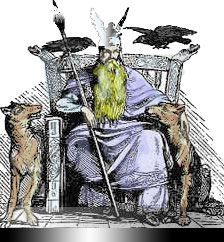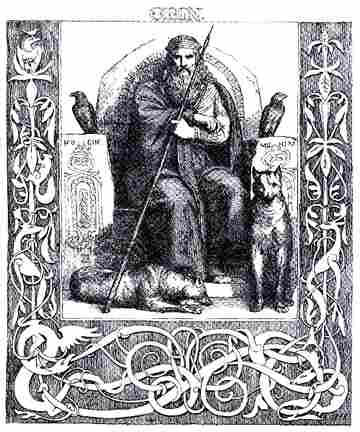Wednesday
Wednesday is called after the Roman god Mercury in Latin languages, e.g. Mercredi in French. According to the Encyclopaedia Mythica, Mercury was the god of "trade and profit, merchants and travelers, but originally of the trade in corn. In later times he was equated with the Greek Hermes." The English name for the day refers to the Anglo-Saxon deity Wodan. (Dutch Woenstag is named for the same god). This god is found throughout the norse and germanic territories, with minor variations on his name - Odin, Wodenaz, Wotan, Woden, Wodan, etc.
Wodan/Odin
 Wodan was the old English form of Odin, the Norse god of wisdom war and magic (Mysterious Britain) Wikipedia suggests Wodan/Odin is "identical with the Germanic god identified as Mercury by Roman writers and possibly with Tacitus’ regnator omnium deus." This seems to be stretching the parallels, as Mercury was not the chief god of Rome and shares only a limited number of attributes with Odin. One source for the identification of Odin with Mercury was apparently Julius Caesar, who saw the Celtic Lugh as identical with Mercury. The interpretation further rests on the assumption that Llugh is the same as Odin. Odin and Lugh were both "intellectual gods, commanding magic and poetry. Both have ravens and a spear as their attributes, and both are one-eyed" according to Wikipedia. Tacitus also saw Mercury and Odin as the same god, both being leaders of souls, according to Wikipedia.
Wodan was the old English form of Odin, the Norse god of wisdom war and magic (Mysterious Britain) Wikipedia suggests Wodan/Odin is "identical with the Germanic god identified as Mercury by Roman writers and possibly with Tacitus’ regnator omnium deus." This seems to be stretching the parallels, as Mercury was not the chief god of Rome and shares only a limited number of attributes with Odin. One source for the identification of Odin with Mercury was apparently Julius Caesar, who saw the Celtic Lugh as identical with Mercury. The interpretation further rests on the assumption that Llugh is the same as Odin. Odin and Lugh were both "intellectual gods, commanding magic and poetry. Both have ravens and a spear as their attributes, and both are one-eyed" according to Wikipedia. Tacitus also saw Mercury and Odin as the same god, both being leaders of souls, according to Wikipedia.
Although a god of war and death, Odin's associations and achievements were generally intellectual, including poetry, healing and the creation of runes. There are several instances of the extreme lengths to which he would go to gain wisdom. He underwent 9 days and 9 nights of extreme pain, hanging from the World Ash Yggdrasill, pierced by his own spear, so that he could gain knowledge. In this way, he learned 9 magical songs and 18 magic runes. Similarly, he sacrificed an eye for a drink from the waters of wisdom in Minir’s well. He also worked for a year as a farmhand for Baugi, so he could get the mead of poetry.
 The Anglo-Saxon kings claimed to be descended from Woden. According to the Anglo-Saxon Chronicle Woden's sons Wecta, Baeldaeg, Casere and Wihtlaeg were the ancestors of the royal houses of the Anglo-Saxon kingdoms. In Norse mythology, Odin was Alfadir (Allfather) as father of the gods: Balder, Hod, and Hermod (with Frigg) Thor (by Jord) and Vidar (by Grid).
The Anglo-Saxon kings claimed to be descended from Woden. According to the Anglo-Saxon Chronicle Woden's sons Wecta, Baeldaeg, Casere and Wihtlaeg were the ancestors of the royal houses of the Anglo-Saxon kingdoms. In Norse mythology, Odin was Alfadir (Allfather) as father of the gods: Balder, Hod, and Hermod (with Frigg) Thor (by Jord) and Vidar (by Grid).
In Norse mythology, Odin's hall (Valaskjalf) is in Valhalla. He watches all events in the 9 worlds from his throne (Hlidskjalf) receiving news from his 2 ravens. His magical possessions include a spear, Gungnir, never misses its target and the ring (Draupnir) which produces 8 new rings every 9 nights, an eight-footed horse (Sleipnir) and two wolves (Freki and Geri) who eat his food - as Odin himself lives on wine. He will be killed by Fenrir (see Tuesday page) on the eve of Ragnorok. (Encyclopaedia Mythica).